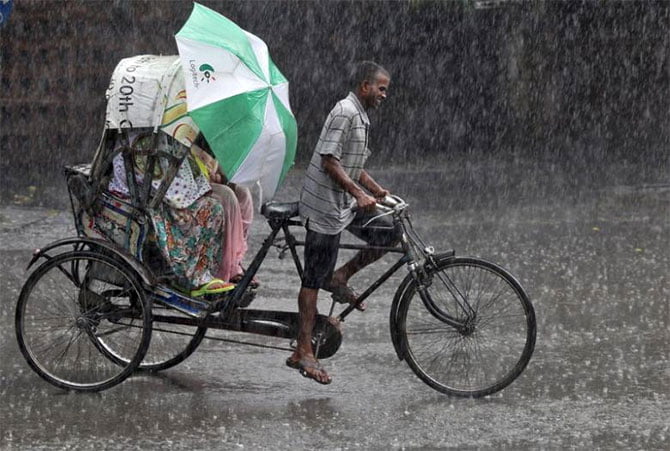

India’s southwest monsoon has been around five per cent less than normal till September 13 in its four-month long season beginning June, increasing the possibility of the India Meteorological Department’s (IMD) projections of normal to higher than normal rains going wrong for the third time in a decade. However, the Met has stuck to its forecast so far.
There is some chance of recovery with rains expected to revive over North-West and Central India from the middle of September. If it doesn’t happen, IMD might have to revise its forecast at the end of the season.
IMD had forecast rains to be 106 per cent of the long period average (LPA, the average rainfall for the past 50 years) with a model error of plus and minus four per cent. If rains do not make a strong recovery towards the fag end of the season, the Met might have to lower its forecast. But, IMD is not changing the projections, as of now.
Senior Met officials said the actual rains could at best be towards the lower end of their statistical error margin – that is, 102 per cent of the LPA.
This would mean actual rains have to be normal, but so far it has been five per cent below normal. Rains in the range of 96 per cent to 104 per cent are normal.
To match IMD’s forecast, the monsoon would have to make real good progress from here onwards.
A low pressure area is developing on the east coast of India, which would cause good rains over Odisha, coastal Andhra Pradesh, east Madhya Pradesh and Telengana over the next 3-4 days.
However, it won’t be sufficient to bridge the deficit leave alone pushing the overall rains to above normal. To reach even normal monsoon levels, September rains have to be 50 per cent more than its average, but in the first 10 days of the month the rains have been 18-19 per cent below average.
“The overall southwest monsoon might end up being 97-98 per cent of LPA against the IMD’s forecast of 106 per cent, which means the Met department’s forecast this year could be lower than the statistical error margin as well,” said a senior meteorologist.
If that happens, this would be the third time in the past decade when the Met department has faltered on its forecast. The first one was in 2009, when it anticipated rains to be normal while in reality the country suffered one of its worst droughts in three decades; and then in 2011.
A neutral La Niña condition, against an expectation of it being positive, and strong influence of Indian Ocean Dipole and Madden Julian Oscillation seem to have made the forecasts go awry.
However, this might not make any tangible impact on sowing of Kharif crops as the area covered is four per cent above last year’s level and the condition of the crop is also good.
Meteorologists say in the next 3-4 days, the daily average monsoon would be 6.5-7.0 millimetres (mm) under the influence of the low pressure area. But, it will struggle to reach the daily average of 4 mm during the second half of September.
[source;rediff.com]




